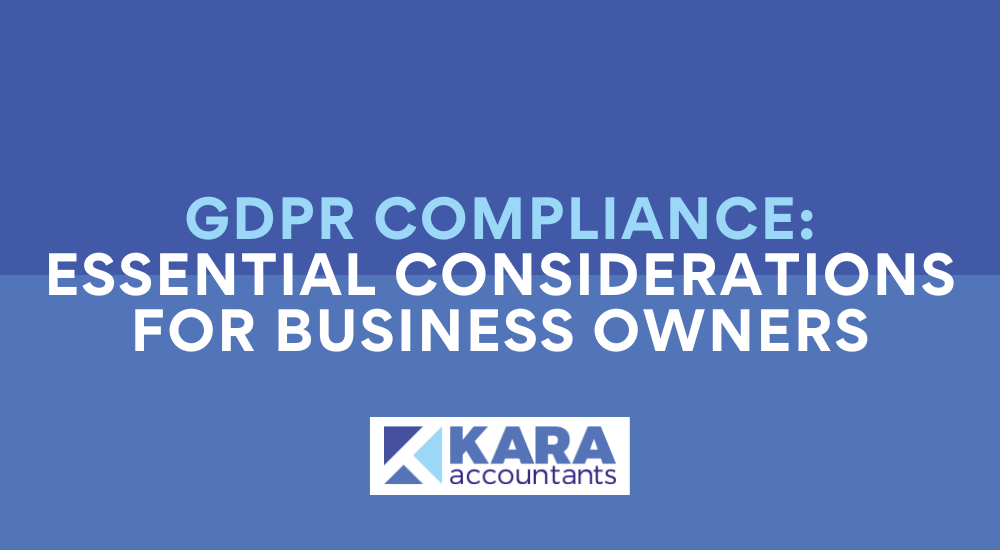
GDPR Compliance: Essential Considerations for Business Owners
The General Data Protection Regulation (GDPR) is a comprehensive data privacy regulation that was enacted in the European Union in 2018. While it primarily governs the handling of personal data within the EU, it has far-reaching implications for businesses worldwide. As a business owner, understanding and complying with GDPR is essential not only to avoid legal consequences but also to build trust with your customers. In this blog, we’ll explore some key considerations for business owners to keep in mind when it comes to GDPR compliance.
Know Your Data
First and foremost, it’s crucial to have a deep understanding of the data you collect, process, and store. Identify what constitutes personal data in your organisation and categorise it accordingly. Personal data can include names, email addresses, financial information, and even IP addresses. Knowing where this data is coming from and how it is being used is a critical first step toward GDPR compliance.
Consent is King
Under GDPR, obtaining clear and explicit consent from individuals to collect and process their data is essential. Make sure that your data collection processes include opt-in mechanisms that clearly explain the purpose for data collection. You should also provide a simple way for individuals to withdraw their consent at any time. Keep records of consent to demonstrate compliance.
Data Protection Impact Assessments (DPIAs)
DPIAs are tools that help businesses assess the impact of data processing activities on data subjects’ privacy. They are particularly crucial when implementing new data processing procedures or technologies. Conducting DPIAs allows you to identify and mitigate potential risks to data subjects and ensure that your data processing activities comply with GDPR.
Data Security
One of the most critical aspects of GDPR is data security. Business owners are responsible for safeguarding the personal data they collect. Implement robust security measures, including encryption, access controls, and regular security audits. Ensure that your employees are trained in data security best practices to minimise the risk of data breaches.
Data Subject Rights
GDPR grants individuals various rights, including the right to access, correct, and delete their personal data. Your business must have processes in place to accommodate these rights. Establish a clear and straightforward procedure for individuals to request their data or request its removal, and be prepared to respond promptly.
Data Processing Records
Maintain comprehensive records of your data processing activities. These records should include information on what data you collect, why you collect it, who has access to it, and how long it is retained. Having these records readily available is not only essential for compliance but also for demonstrating accountability.
Data Transfer
If your business operates internationally or uses third-party data processors, ensure that data transfers outside the European Economic Area (EEA) comply with GDPR. Using standard contractual clauses or other legal mechanisms can help you achieve this. Be cautious about where your data is stored and processed, and only work with GDPR-compliant partners.
Data Breach Response
In the event of a data breach, GDPR requires businesses to notify both the supervisory authority and affected individuals within 72 hours. Develop a robust incident response plan that outlines the steps to take in case of a breach, including notifying the appropriate authorities and affected parties.
Data Protection Officer (DPO)
Depending on the size and nature of your data processing activities, you may need to appoint a Data Protection Officer. A DPO is responsible for ensuring GDPR compliance within your organisation and acting as a point of contact for data protection authorities and data subjects.
Ongoing Compliance
GDPR compliance is an ongoing process, not a one-time task. Regularly review and update your data protection practices, policies, and procedures to stay in compliance with any changes in the regulation and to adapt to the evolving data privacy landscape.
GDPR compliance is a fundamental aspect of doing business in the digital age. Neglecting it can result in severe financial penalties and damage to your reputation. As a responsible business owner, it’s your duty to protect the personal data of your customers and to demonstrate your commitment to their privacy. By understanding and implementing these key considerations, you can navigate GDPR successfully and foster trust with your audience.

This Post Has 0 Comments